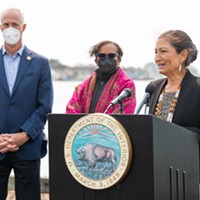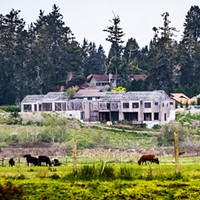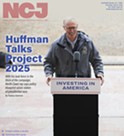Friday, May 10, 2019
Lack of Water Threatens Trinidad Rancheria Hotel Project
Posted By Elaine Weinreb on Fri, May 10, 2019 at 1:32 PM
The planned 100-room Trinidad Rancheria hotel at Cher-Ae Heights Casino appears stalled at the state level because of an inability to come up with a definite source of drinking water for the facility.
Located on the bluffs of Scenic Drive, a mile south of city limits, the planned hotel is outside of Trinidad's water service area, which is designated by the city's General Plan. The city is in the process of studying its own limited water supply from Luffenholz Creek and does not yet know if there would be enough water to accommodate all present and future users within the existing service areas and the hotel, especially during drought years.
Approval for the hotel is currently being considered by the Bureau of Indian Affairs (BIA) but it won't move forward until it receives "concurrence" from the California Coastal Commission that the project will not violate the California Coastal Act, which requires that developments in the coastal zone have a definite source of drinking water.
The California Coastal Commission has found other problems with the plans for the five-story building, as well, including incongruity with the pristine ocean views around Trinidad Head, possible issues with wastewater disposal and its location upon an unstable bluff top. Coastal Commission staff has recommended it object to the project.
Although the commission was initially scheduled to hear the project in April, the BIA — acting on behalf of the Trinidad Rancheria — requested it delay holding a public hearing on the project to allow the Rancheria to provide additional information. The Coastal Commission responded by re-scheduling the project hearing from April to June, when it will meet in San Diego.
At the May 7 meeting of the Humboldt County Board of Supervisors, Fifth District Supervisor Steve Madrone made a motion asking the board to write a letter to the BIA requesting that the Coastal Commission's hearing on the hotel be further delayed to its August meeting in Eureka. That would give locals the opportunity to attend the meeting and provide input on the hotel plans without traveling 750 miles south.
"We're not here today to discuss the project," Madrone said. "We're simply talking about a public process and asking that something so important be held locally."
Three representatives of the Trinidad Rancheria then spoke, urging the board not to request any further delays.
"The tribe's critical pathway to bring information before the Coastal Commission in June is crucial to the economic success of the project,” said Trinidad Rancheria CEO Jacque Hostler-Carmesin. “We cannot delay this project."
David Tyson, interim CEO for the Trinidad Rancheria Economic Development Corporation, said the Rancheria had made a long-term effort to be transparent.
"It's important that this project move forward," he said. "Time kills deals and, in this case, time is money. The tribe is spending a great deal of its money in answering these questions and moving forward with the Bureau of Indian Affairs and the Coastal Commission. It's imperative that this be on the June meeting. Funding [for the project] is determined by that outcome. Loan guarantees are determined by that outcome."
Tribal member Shirley Laos said there had already been plenty of opportunities for public comment and she did not understand why the Rancheria should have to endure further delays.
Kent Sawatsky, who is not a tribal member, said that he wants the meeting to be held locally and that he could not attend a meeting that was hundreds of miles away.
"This is a major issue," he said. "If it were held down there, only one or two people would go down there. But if it were held locally, 30 or 40 people might attend. We're all entitled to public participation. This is just a two-month delay on a project that has been going for 12 years."
He wondered if the Rancheria was "location shopping to have this meeting where we cannot participate."
Madrone noted that when the project had first been publicized by the Rancheria, several years ago, the plans were for a two-story hotel, but have since evolved into a five-story hotel.
"I don't know why one would not support a request to have the hearing locally and have the ability of the community to engage" he said. "We're talking about a two-month delay when, in fact, over the past couple of months, the Rancheria themselves and the BIA have requested several delays when they submitted inadequate information for the project. ... The Coastal Commission staff was recommending denial of the project because of inadequate information, particularly about water, landslides, traffic and other impacts."
Although Third District Supervisor Mike Wilson thought Madrone's request was reasonable, the other three supervisors did not. Second District Supervisor Estelle Fennell expressed her support for the tribe's concerns and her confidence that the Coastal Commission would examine all the evidence rigorously. Fourth District Supervisor Virginia Bass said she did not think it was appropriate for the board as a whole to request a delay but that Madrone, as an individual supervisor, was welcome to do so.
A long and increasingly heated argument ensued, with the words "disrespect," "frustration," and "blackmail" thrown around. At one point, Madrone asked if there is some reason his fellow supervisors “don't want this project to be viewed by the community." But after 15 minutes of discussion, he rescinded his motion.
The following evening, the Trinidad City Council heard a highly technical report from City Engineer Steve Allen on the capacity of the city's water treatment plant. The study, however, shed little light on whether or not the city could serve the hotel with water. The report was limited to how many gallons of purified water per day the water treatment plant is capable of providing under current conditions.
The report noted that the treatment plant does produce enough water to supply the city's current residents and even produces a surplus. However, Allen emphasized that there were many questions the study did not address, including how many additional customers the city could serve. Further studies are needed to answer these questions, he said.
Trinidad's priorities for water usage are spelled out in its General Plan and its top priority is serving all customers, existing and future, within the boundaries of its water service area. The state's recent passage of a law permitting a secondary dwelling unit on most parcels could add considerable density to the town's population. The city planner is currently working on a study to analyze the water demand that could result from the potential build-out.
In addition, state law requires that a certain amount of water be left in the stream to serve fish and wildlife. This means that in a drought year, the city might have to cut back on supplying water to existing residents to meet these flow requirements. Moreover, other landholders with properties outside city limits but that adjoin Luffenholz Creek already hold riparian rights on the creek's water, and these potential appropriations must be honored as well — if there is enough water to do so. Fourth on the priority list, are existing visitor-serving facilities along Patrick Point Drive, a mandate created by regulations of the California Coastal Commission.
According to the report, "There is no known documentation indicating that the creek flow has previously decreased to the point that the city's intake rate needed to be reduced. However, periods of drought, long term changes in the climate and increased extractions in the upstream watershed could result in restrictions in the future. It is important for the city to remain mindful of these future potential changes in creek flow and not over commit the water supply, which could become restricted due to low flow in the creek at some point."
The report aroused a lot of comment, both from the audience and from council members. Several were quick to point out that simply having a surplus was meaningless without knowing how much of the surplus was likely to be needed in the future. Eventually, the council agreed that more studies are needed before making any kind of decision about future commitments of the town's water supply.
Located on the bluffs of Scenic Drive, a mile south of city limits, the planned hotel is outside of Trinidad's water service area, which is designated by the city's General Plan. The city is in the process of studying its own limited water supply from Luffenholz Creek and does not yet know if there would be enough water to accommodate all present and future users within the existing service areas and the hotel, especially during drought years.
Approval for the hotel is currently being considered by the Bureau of Indian Affairs (BIA) but it won't move forward until it receives "concurrence" from the California Coastal Commission that the project will not violate the California Coastal Act, which requires that developments in the coastal zone have a definite source of drinking water.
The California Coastal Commission has found other problems with the plans for the five-story building, as well, including incongruity with the pristine ocean views around Trinidad Head, possible issues with wastewater disposal and its location upon an unstable bluff top. Coastal Commission staff has recommended it object to the project.
Although the commission was initially scheduled to hear the project in April, the BIA — acting on behalf of the Trinidad Rancheria — requested it delay holding a public hearing on the project to allow the Rancheria to provide additional information. The Coastal Commission responded by re-scheduling the project hearing from April to June, when it will meet in San Diego.
At the May 7 meeting of the Humboldt County Board of Supervisors, Fifth District Supervisor Steve Madrone made a motion asking the board to write a letter to the BIA requesting that the Coastal Commission's hearing on the hotel be further delayed to its August meeting in Eureka. That would give locals the opportunity to attend the meeting and provide input on the hotel plans without traveling 750 miles south.
"We're not here today to discuss the project," Madrone said. "We're simply talking about a public process and asking that something so important be held locally."
Three representatives of the Trinidad Rancheria then spoke, urging the board not to request any further delays.
"The tribe's critical pathway to bring information before the Coastal Commission in June is crucial to the economic success of the project,” said Trinidad Rancheria CEO Jacque Hostler-Carmesin. “We cannot delay this project."
David Tyson, interim CEO for the Trinidad Rancheria Economic Development Corporation, said the Rancheria had made a long-term effort to be transparent.
"It's important that this project move forward," he said. "Time kills deals and, in this case, time is money. The tribe is spending a great deal of its money in answering these questions and moving forward with the Bureau of Indian Affairs and the Coastal Commission. It's imperative that this be on the June meeting. Funding [for the project] is determined by that outcome. Loan guarantees are determined by that outcome."
Tribal member Shirley Laos said there had already been plenty of opportunities for public comment and she did not understand why the Rancheria should have to endure further delays.
Kent Sawatsky, who is not a tribal member, said that he wants the meeting to be held locally and that he could not attend a meeting that was hundreds of miles away.
"This is a major issue," he said. "If it were held down there, only one or two people would go down there. But if it were held locally, 30 or 40 people might attend. We're all entitled to public participation. This is just a two-month delay on a project that has been going for 12 years."
He wondered if the Rancheria was "location shopping to have this meeting where we cannot participate."
Madrone noted that when the project had first been publicized by the Rancheria, several years ago, the plans were for a two-story hotel, but have since evolved into a five-story hotel.
"I don't know why one would not support a request to have the hearing locally and have the ability of the community to engage" he said. "We're talking about a two-month delay when, in fact, over the past couple of months, the Rancheria themselves and the BIA have requested several delays when they submitted inadequate information for the project. ... The Coastal Commission staff was recommending denial of the project because of inadequate information, particularly about water, landslides, traffic and other impacts."
Although Third District Supervisor Mike Wilson thought Madrone's request was reasonable, the other three supervisors did not. Second District Supervisor Estelle Fennell expressed her support for the tribe's concerns and her confidence that the Coastal Commission would examine all the evidence rigorously. Fourth District Supervisor Virginia Bass said she did not think it was appropriate for the board as a whole to request a delay but that Madrone, as an individual supervisor, was welcome to do so.
A long and increasingly heated argument ensued, with the words "disrespect," "frustration," and "blackmail" thrown around. At one point, Madrone asked if there is some reason his fellow supervisors “don't want this project to be viewed by the community." But after 15 minutes of discussion, he rescinded his motion.
The following evening, the Trinidad City Council heard a highly technical report from City Engineer Steve Allen on the capacity of the city's water treatment plant. The study, however, shed little light on whether or not the city could serve the hotel with water. The report was limited to how many gallons of purified water per day the water treatment plant is capable of providing under current conditions.
The report noted that the treatment plant does produce enough water to supply the city's current residents and even produces a surplus. However, Allen emphasized that there were many questions the study did not address, including how many additional customers the city could serve. Further studies are needed to answer these questions, he said.
Trinidad's priorities for water usage are spelled out in its General Plan and its top priority is serving all customers, existing and future, within the boundaries of its water service area. The state's recent passage of a law permitting a secondary dwelling unit on most parcels could add considerable density to the town's population. The city planner is currently working on a study to analyze the water demand that could result from the potential build-out.
In addition, state law requires that a certain amount of water be left in the stream to serve fish and wildlife. This means that in a drought year, the city might have to cut back on supplying water to existing residents to meet these flow requirements. Moreover, other landholders with properties outside city limits but that adjoin Luffenholz Creek already hold riparian rights on the creek's water, and these potential appropriations must be honored as well — if there is enough water to do so. Fourth on the priority list, are existing visitor-serving facilities along Patrick Point Drive, a mandate created by regulations of the California Coastal Commission.
According to the report, "There is no known documentation indicating that the creek flow has previously decreased to the point that the city's intake rate needed to be reduced. However, periods of drought, long term changes in the climate and increased extractions in the upstream watershed could result in restrictions in the future. It is important for the city to remain mindful of these future potential changes in creek flow and not over commit the water supply, which could become restricted due to low flow in the creek at some point."
The report aroused a lot of comment, both from the audience and from council members. Several were quick to point out that simply having a surplus was meaningless without knowing how much of the surplus was likely to be needed in the future. Eventually, the council agreed that more studies are needed before making any kind of decision about future commitments of the town's water supply.
Speaking of...
Comments (3)
Showing 1-3 of 3
Readers also liked…
more from the author
-
Trouble on the Mountain
A popular outdoor recreation area is also a makeshift shooting range, causing growing safety concerns
- Jan 11, 2024
- More »








































